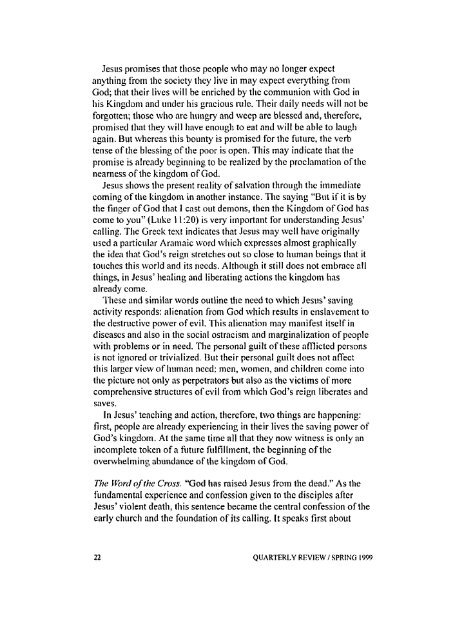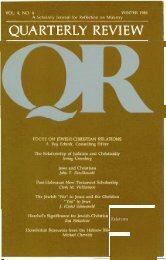Spring 1999 - Quarterly Review
Spring 1999 - Quarterly Review
Spring 1999 - Quarterly Review
You also want an ePaper? Increase the reach of your titles
YUMPU automatically turns print PDFs into web optimized ePapers that Google loves.
Jesus promises that those people who may no longer expectanything from the society they live in may expect everything fromGod; that their lives will be enriched by the communion with God inhis Kingdom and under his gracious rule. Their daily needs will not beforgotten; those who are hungry and weep are blessed and, therefore,promised that they will have enough to eat and will be able to laughagain. But whereas this bounty is promised for the future, the verbtense of the blessing of the poor is open. This may indicate that thepromise is already beginning to be realized by the proclamation of thenearness of the kingdom of God.Jesus shows the present reality of salvation through the immediatecoming of the kingdom in another instance. The saying "But if it is bythe finger of God that I cast out demons, then the Kingdom of God hascome to you" (Luke 11:20) is very important for understanding Jesus'calling. The Greek text indicates that Jesus may well have originallyused a particular Aramaic word which expresses almost graphicallythe idea that God's reign stretches out so close to human beings that ittouches this world and its needs. Although it still does not embrace allthings, in Jesus' healing and liberating actions the kingdom hasalready come.These and similar words outline the need to which Jesus' savingactivity responds: alienation from God which results in enslavement tothe destructive power of evil. This alienation may manifest itself indiseases and also in the social ostracism and marginalization of peoplewith problems or in need. The personal guilt of these afflicted personsis not ignored or trivialized. But their personal guilt does not affectthis larger view of human need: men, women, and children come intothe picture not only as perpetrators but also as the victims of morecomprehensive structures of evil from which God's reign liberates andsaves.In Jesus' teaching and action, therefore, two things are happening:first, people are already experiencing in their lives the saving power ofGod's kingdom. At the same time all that they now witness is only anincomplete token of a future fulfillment, the beginning of theoverwhelming abundance of the kingdom of God.The Word of the Cross. "God has raised Jesus from the dead." As thefundamental experience and confession given to the disciples afterJesus' violent death, this sentence became the central confession of theearly church and the foundation of its calling. It speaks first about22 QUARTERLY REVIEW/SPRING <strong>1999</strong>












